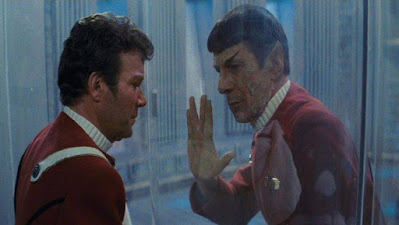[Back in 2018, there was a social media challenge on Facebook in which a person posted a picture a day for 10 days of 10 films that made an impact on them. However, I went a step beyond and posted an explanation as to why they made that impact. For the sake of posterity, they're being reposted here in their entirety (with some modification/update where warranted)]:
Day 7 of 10 movies that had an impact on me. 10 films that inspired you, 10 days, one image. I was nominated for this challenge by the esteemed educator and author Andrew Baldwin. You got your own choices to post, don’t you? What’re yew waitin’ fer?
Here’s another “big surprise” entry. In truth, the surprise was actually WHICH film of the first two film in the series to choose! The first film may have been derided in later years as “The MotionLESS Picture,” but that film "wow’ed" me in so many different respects that compensated for the action-less narrative. For the first time, one got a tangible sense of the immense size of the U.S.S. Enterprise. For those of us used to reruns of ‘60s (state-of-the-art-on-a budget) effects, the special effects of the first film were astounding. Further, Jerry Goldsmith’s (with uncredited assist from series theme composer Alexander Courage) orchestrations were nothing short of phenomenal.
But my personal winner, even to this day, remains the most powerfully affecting. It was a game changer. Back then, as the intrepid crew of The Enterprise was created on broadcast television, they carried with them the same subconscious expectations of television as it was back in the day: done-in-one adventures with the characters resetting back to the status quo by episode’s end. Yes, there’d be some moral imparted and people learning something new about themselves, but by the end each toy was put back in the box as pristine as they were taken out. Even the first film followed this paradigm.
Not this time.
Instead of being forced to wear Vaseline on their faces and pretend to be only 2 ½ years older rather than a decade, the actors were presented as the were in “real time”, facing issues rarely explored on broadcast television. Instead of being treated as avatars of well-worn pop culture catchphrases, they were presented as three-dimensional characters. The weight of their history and age upon their shoulders, even if it only seemed to weigh down Admiral James T. Kirk. The crew found themselves facing their mortality and the real prospect of death in intimate, real fashion that they never had before.
"I haven't faced death. I've cheated death. I've tricked my way out of death and -- patted myself on the back for my ingenuity. I know nothing."
- Admiral James T. Kirk (William Shatner).
So much can be said for this film…the space naval score by rising-star composer James Horner, Ricardo Montalban’s real-chesty, go-for-broke performance, the debut of the then-fetching Kirstie Alley…but it’s the relationships that carry the film, none more powerfully than the image presented here. Back in the day, the actors were marginalized; their talents dismissed by the nature of the material and medium of the original presentation. Say what you will about Shatner (trust me, I do), but he is capable of powerful subtlety. The late Leonard Nimoy was the show’s and films’ blessing, being the type of actor whose presence elevates the material he’s given. Yes, the scene can be considered a cheat because the emotions were for many bolstered from years of seeing these characters in endless reruns (“Star Trek”, technically, has never been off the air). But it was that moment that many realized that they saw these characters as real people, and that the “big death” was akin to that of a family member. The status quo was gone. There was no reset; no pat, pithy comeback to end an episode and off to the next adventure. Instead, there was the understanding that despite the death, life goes on.
"You knew enough to tell Saavik that how we face death is at least as important as how we face life."
"Just words."
"But good words. That's where ideas begin. Maybe you should listen to them."
- David Marcus (Merritt Butrick) and Admiral Kirk (William Shatner).
The consequences would carry over from this film onward. Most importantly the characters emotionally matured, now in sync with their physicality. It would take two films for that status quo to be reset (to a certain degree), but here there was something the franchise had lacked until that moment: Unpredictability. It felt like it had truly gone where it hadn't gone before. There was a new tomorrow on the horizon; a bittersweet one, but a new one nonetheless.
It felt…young.


No comments:
Post a Comment